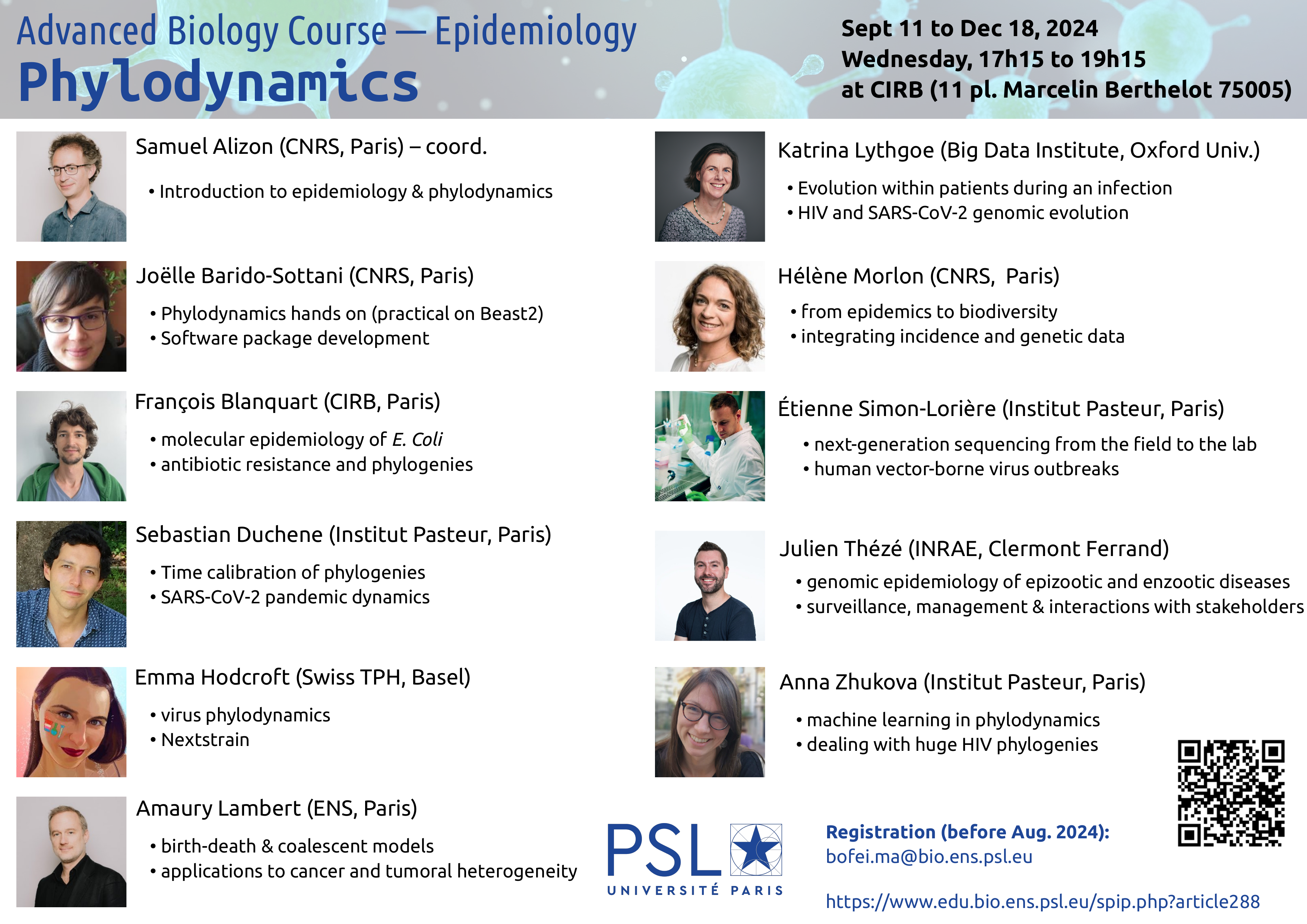ABC-E — Advanced Biology Course in Epidemiology : Phylodynamics
PSL Master in Life Sciences - ENS
BIO-PG-ABCE-S1|ABC-E - Advanced Biology Course in Epidemiology : Phylodynamics
Year and Semester : M1, M2 and PhD | S1
Venue : CIRB, Collège de France, 11 place Marcelin Berthelot | Bâtiment D | Room D2, 2nd floor
Duration : 11 sessions of 2h15
Hours : From September 11 to December 18 on Wednesdays, 5:15-7:30 p.m.
Maximum class size : 30 students
This course is open to external students. Contact : Bofeil Ma
Coordination
Samuel Alizon, CIRB, Collège de France
Credits
3 ECTS
Keywords
evolution | bioinformatics | microbes | genomics | public health | modelling | surveillance | immunology | ecology | sequencing | machine learning | statistics
Course prerequisites
This course from the PSL Graduate Program in Life Sciences is open to M1, M2 & PhD candidates. Each speaker will provide a background. However, notions in microbiology, computational biology, and mathematics & statistics will help.
When applying, please send a 1 page CV and a short motivation paragraph for attending the course.
Course objectives and description
Aims
The aim of this interdisciplinary course is to explore epidemiology through the lens of a timely topic, this year phylodynamics. This emerging subfield proposes to analyse microbial genomes in order to understand the way they spread and evolve.
Themes
The course will cover a variety of aspects such as field work and surveillance, analysis of next generation sequencing data, software package development, modeling (using tools from statistic, mathematics, or machine learning). Applications will be diverse with human virus epidemics, bacterial zoonoses, or within-host cancer dynamics. Speakers will also share their experience in communicating with the general public or public health agencies.
Organization
Each session will consist in a keynote lecture from a guest speaker (1h), followed by a discussion, and an article presentation by the students. One of the sessions will be a practical.
Assessment
- Validation for M1/M2 (with grades) : Article presentation or small project. Students that require a validation should contact the organizers in advance.
- Validation without grades : presence to at least 8 sessions
- It is possible to attend the course without validation and registration. However, registered students will have priority in case of overcrowding.
Course material
Slides and presentations will be made available online by the lecturers.
Suggested readings in relation with the module content
- Grenfell BT et al. 2004. Unifying the epidemiological and evolutionary dynamics of pathogens. Science 303:327–32. DOI : 10.1126/science.1090727
- Volz EM et al. 2013. Viral phylodynamics. PLoS Comput Biol 9:e1002947. DOI : 10.1371/journal.pcbi.1002947
- Attwood SW et al. 2022. Phylogenetic and phylodynamic approaches to understanding and combating the early SARS-CoV-2 pandemic. Nat Rev Genetics 23:547–562. DOI : 10.1038/s41576-022-00483-8
Instructors
Samuel Alizon (CIRB, CNRS, Paris, coord.)
Katrina Lythgoe (Oxford University, UK)
Sebastian Duchène (Institut Pasteur, Paris)
Joelle Barido-Sottani (IBENS, CNRS Paris)
Amaury Lambert (IBENS, ENS, Paris)
François Blanquart (CIRB, CNRS Paris)
Emma Hodcroft (STPHI, Basel)
Julien Thézé (INRAE, Clermont Ferrand)
Étienne Simon-Lorière (Institut Pasteur, Paris)
Anna Zhukova (Institut Pasteur, Paris)
Hélène Morlon (IBENS, CNRS, Paris)




